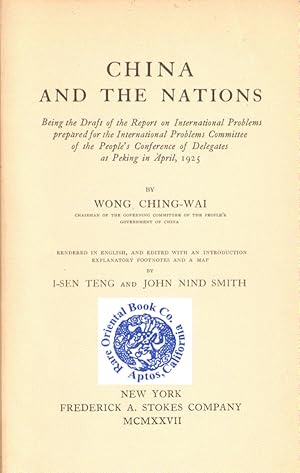A propos de cet article
New York 1927, Stokes. Blue cloth, very good, 137p., index, translated & edited by I-Sen Teng & John N. Smith, map, 14 x 22cm., bit faded spine, H.S. Quigley's signed copy, printed from the British Edition sheets. FIRST AMERICAN EDITION WHO WAS WONG CHING-WAI or WANG CHING-WEI [aka. WANG JINGWEI] . Although the title page spells the author's name as: "WONG Ching-wai" this was a common transliteration error of Chinese names at that time. Regardless of the spelling, he is actually Wang Ching-wei, WorldCat also names him as: Zhaoming Wang. . Wang Ching-Wei [1883-1944] was better known to the Chinese as Wang Jingwei, born as Wang Zhaoming [Wang Chao-ming]. He was widely known by his 'pen name' "Jingwei," as a Chinese politician, only later to turn against Sun Yat-sen, the KMT party and become a despised traitor and Japanese Government sympathizer during second Sino-Japanese war 1937-1945. . Wang was a very controversial character, and in the end, became a traitor and supporter of 'conservative Japanese' government policy while becoming the highest official of Japanese controlled parts of China. He has been hated and the subject of shame to the Chinese both Nationalists and Communists. . . Wang was initially a member of the left wing of the Kuomintang [KMT] party, but later became increasingly anti-communist after his efforts to collaborate with the Chinese Communist Party [CCP] ended in political failure. His political orientation veered sharply to the right later in his career after he joined the Japanese [against his own countrymen.] *** WANG'S TRAITOROUS POLITICAL ASSOCIATIONS: . Wang was a close associate of Sun Yat-sen during the last twenty years of Sun's life. After Sun's death, Wang engaged in a political struggle with Chiang Kai-shek for control over the Kuomintang Party, but he lost. . Wang remained inside the Kuomintang, but continued to have disagreements with Chiang until the outbreak of the Second Sino-Japanese War in 1937. After which he accepted a controversial invitation from the Imperial Japanese Government to join them to form a "Japanese-supported" collaborationist government in Nanjing. . Wang served as the head of that Chinese state for the Japanese until he died, shortly before the end of World War II. Although he is still regarded as an important contributor in the Xinhai Revolution, his collaboration with the Imperial Japanese Government is a subject of academic debate, and the typical narratives often regard him as a traitor in the "War of Resistance." . Above extracted, corrected & enhanced by us from Wikipedia see below. *** CONTENTS OF THIS WORK: Per the preface: "The essays express the official statements and permanent opinion of China's National Party and of the mass of Chinese, as voiced by Wang Ching-wei." [summarized] . Wang outlines the "Will of the President of the Kuomintang." His "Prefatory Letter, addressed to the preliminary Conference." . His essays continue to define the "Definition of Imperialism, The Influence of Imperialism on World Politics." . He continues with case examples of: "The Influence of Imperialism in China: Introductory Survey: . First Period: From the Opium War to the Sino-Japanese War 1890-1894. . Second Period: From the Sino-Japanese War to the Boxer Rising 1895-1900. . Third Period: From the Boxer Rising to the Beginning of the Great European War 1900-1914. . Forth Period: From the Beginning of the Great European War to the Washington Conference 1914-1921. . Fifth Period: From the Washington Conference up to the present." [Present means 1927, publication date of this book, the first year of the Communist Revolution in China] . "The Chinese People's Revolution Against Imperialism. . Resolutions Concerning International Problems, Drafted for the People's Conference." *** With a folding map of China, based on that prepared by Dr. Sun Yat-sen, showing government controlled railways. With a bibliography. *** CONDITION: This is a very nice copy, in original blue cloth, with t. N° de réf. du vendeur 36003103
Contacter le vendeur
Signaler cet article
![]()
